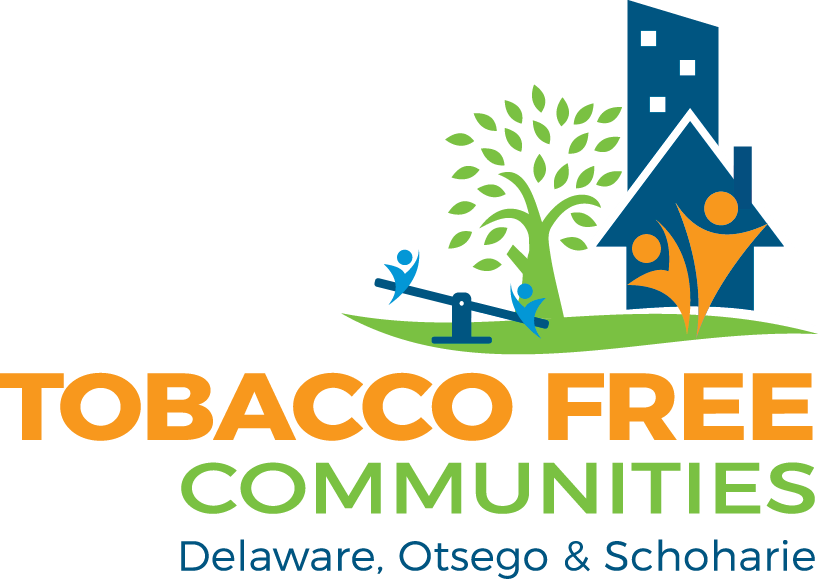It’s simple, don’t smoke
February 20, 2019 – Times Journal – Cobleskill, NY
Dear Editor,
I am a local mental health advocate who is concerned about smoking, vaping and the use of tobacco/nicotine products among adults and kids living in our community.
Over the years society has changed its thoughts about smoking. It doesn’t seem to be very popular these days to be a smoker. You’re unable to smoke now in most public buildings and there are many alarming commercials on television showing the dangerous effects of smoking on our health.
But Advancing Tobacco Free Communities in Delaware, Otsego and Schoharie Counties (ATFC-DOS) recently made me aware of just how this dangerous issue impacts individuals and communities and how many people it impacts – especially people with mental health issues.
I learned that approximately 1,315 Americans die every day because of tobacco use. That number was difficult to wrap my head around until I realized that the tragic loss is equivalent to three 747 airplanes full of people crashing every day in the U.S. That startled me. Another fact that affected me deeply was that people with poor mental health also have one of the highest rates of smoking in New York State. For adults in the state who report frequent mental distress, the percent who smoke cigarettes is 26 percent.
New and emerging nicotine products like electronic cigarettes, heated tobacco products and hybrid products with all kinds of flavors (often used by teens and young adults) may seem like they are “safer” alternatives, but they are not and many are not aware of this. As a result, individuals substitute cigarettes with these newer products, use them regularly thinking it is not as bad for them and end up putting themselves at terrible future health risk. Unfortunately, these alternative tobacco/nicotine products now threaten all the good gains that have been achieved recently in helping people be safer regarding tobacco use.
The good news is that this danger is preventable. It is true that it is hard to stop using tobacco/nicotine products. That’s obviously why many people do not quit or even try. But it’s difficult to stop because tobacco/nicotine use is an addiction. There are many different things that exist to help people quit from special gums to patches to medications, as well as plenty of available information regarding healthier substitute lifestyle habits and coping skills to help people quit more easily. Physicians can also offer medical approaches and ideas or even point people in directions to get the best help that would probably work for them. You can also call the NYS Smokers’ Quitline at 1-866-NY-QUITS and check out some local smoking cessation programs. Most health insurance plans, including Medicaid, also cover meds to help you quit.
Don’t feel ashamed or alone in struggling with this tobacco use challenge. Many people are struggling right now to quit. In fact, the current New York State rate of adult smokers is 14.2 percent, but in our rural county and in the two adjacent counties of Otsego and Delaware – our rates are higher. Schoharie is 18.1 percent, Otsego is 19.7 percent and Delaware is 23.4 percent.
I know quite a few people that I care about still use tobacco products. As much as I want them to quit to be healthier, I also know, like many things in life, it has to be their choice. I also know quitting is a process which can make it difficult to remain patient with loved ones through their journey of quitting. I just reassure them that it sometimes takes a few tries, that it’s okay and each attempt to quit is another important step closer to doing so. And then I help them find more information about other ways of trying to quit for when they’re ready to try again.
That’s why New York State tobacco control programs like ATFC-DOS are so important. Their job is to keep us informed as a community about how this issue actually affects us all, especially in ways that we might not be aware.
I know there are many problems in the world. It can feel overwhelming especially when you feel powerless to change things. And sometimes that feeling of powerlessness makes it hard to think about another issue to deal with like tobacco. However, we individuals actually CAN do something about tobacco/nicotine use. It might be making the powerful choice to begin to try and quit yourself or maybe it is helping support a friend or loved one to quit for better health or maybe it is helping support and advocate for existing programs and agencies in our community that are struggling to help us fix this tricky problem.
There are definitely small steps that you can do now that can add up to significant healthy results in time.
Jason Paden
Schoharie



